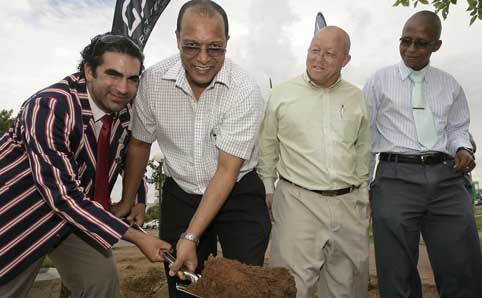Latest News Archive
Please select Category, Year, and then Month to display items
![]()
The National Research Foundation (NRF) ratings are considered the benchmark for research excellence. This year the University of the Free State (UFS) has 17 newly NRF-rated researchers. This brings the total number of NRF-rated researchers at UFS to 160.
NRF ratings are allocated based on a researcher’s recent research outputs and impact as perceived by national and international peer reviewers. The rating system encourages researchers to publish high-quality research papers in journals of high impact and to publish books through reputed academic publishers. The NRF rating system is a valuable tool for benchmarking the quality of our researchers against the best in the world.
Research at the heart of the UFS
Prof Francis Petersen, Rector and Vice-Chancellor, has indicated that the UFS provides significant support to researchers to apply for new NRF ratings or to re-apply for rating. These initiatives include the mock NRF rating panels managed by the Prestige Scholars Programme (PSP), evaluation of individual research outputs and recommendations on timely applying for rating, and improvements on rating applications by a panel consisting of internal and external members. These initiatives are bearing fruit by increasing the number of rated researchers who will transform the research profile and increase the diversity of UFS researchers.
Cultivating the best researchers.
According to Eleanor van der Westhuizen, from Research Development: “The rating of individuals is based primarily on the quality and impact of their research outputs over the past eight years, taking into consideration the evaluation made by local and international peers. It identifies researchers who count among the leaders in their fields of expertise and gives recognition to those who have a sustained production of high-quality research outputs. Several South African universities use the outcomes of the NRF evaluation and rating process to position themselves as research-intensive institutions, while others such as the UFS provide incentives for their staff members to acquire and maintain a rating.”
Cream of the crop
The UFS has also upped the ante with regard to its total number of NRF-rated researchers during the latest rating and evaluation, with an increase from 149 to 160 rated researchers in 2018.
Prof Heidi Hudson, Dean of Humanities, received an NRF B-rating, which brings the total of B-rated researchers to six. Other B-rated researchers incude Prof Johann Meyer (Mathematics), Prof Fanie Snyman and Prof Francois Tolmie (Theology), Prof Felicity Burt (Medical Microbiology) and Prof Andre Roodt (Chemistry). A total number of 10 new C-ratings and six new Y-ratings were achieved during the 2018 evaluation process.
“NRF-rating is indicative of the university’s drive to enhance its research profile nationally and internationally. Congratulations to all the scientists and scholars who received a rating in 2017. I am thankful to our academics for their commitment to the rating process,” said Prof Corli Witthuhn, Vice-Rector: Research at the UFS.
Construction work on new residences begins
2012-02-24
 |
|
From left are: Richard Chemaly, SRC President; Mr Quintin Koetaan; Prof. Nicky Morgan, Vice-Rector: Operations and Mr Pura Mgolombane, Assistant Dean: Student Affairs, at the sod turning ceremony.
Photo: Johan Roux
24 February 2012
|
Construction of two new residences on our Bloemfontein Campus will begin soon. Some 500 students will be accommodated in the residences, with the first students able to move in from January 2013.
The premises where the residences will be built were recently handed over to the contractors.
Mr Rudi Buys, Dean of Student Affairs, says that the design of the residences follow global trends in student accommodation, but are adapted to local needs and student communities. The new residences will provide more study and tutoring spaces, also with more open space for diverse students to socialise. The residences will function together as a Student Life College.
Mr Quintin Koetaan, Director: Housing and Residence Affairs, says the new residences will house both junior and senior students. Residences will co-ed, with men and women housed in separate and secure passages.
The planned construction of student accommodation includes five new residences – four on the Bloemfontein Campus that will provide 1000 beds and one on the Qwaqwa Campus with 250 beds. This will provide for the increasing need for student accommodation. The project will be completed in two phases. Phase one commenced in Bloemfontein on 21 February 2012.